Key takeaways:
- Ocean conservation is a shared responsibility, vital for maintaining marine ecosystems threatened by pollution, overfishing, and climate change.
- Plastic pollution disrupts marine life and enters the food chain, necessitating urgent action to reduce plastic usage and protect both human health and oceans.
- Overfishing and bycatch, combined with the use of harmful equipment, significantly harm marine ecosystems and demand a reevaluation of fishing practices.
- Individual actions, such as using sustainable materials and participating in local clean-up efforts, can collectively lead to positive environmental change in fishing communities.
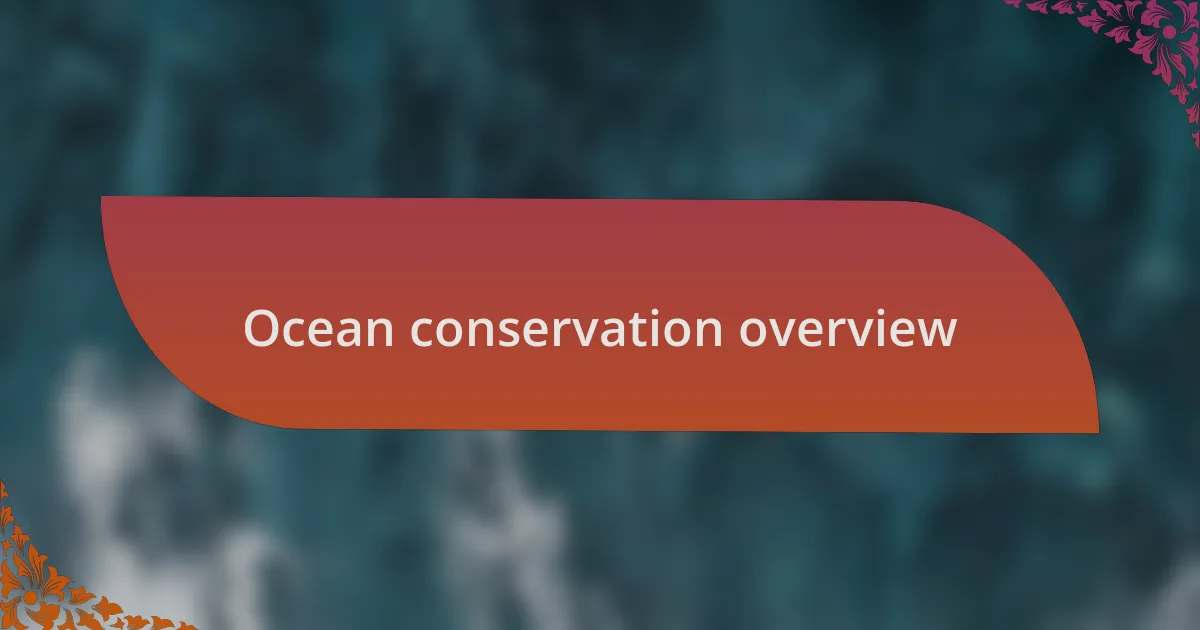
Ocean conservation overview
Ocean conservation is not just a concern for scientists or activists; it’s something that touches all of us, whether we realize it or not. I’ve often found myself standing on the beach, watching the waves, feeling a deep connection to the ocean. It’s heartbreaking to realize that our beloved waters are suffering from pollution, overfishing, and climate change. How can we truly enjoy the beauty of the ocean while ignoring its plight?
Every time I cast my line into the water, I think about the delicate ecosystems beneath the surface. The coral reefs, the fish, and even the minuscule plankton all play a pivotal role in maintaining the balance of marine life. This balance is precariously tipping, largely due to human activities. It makes me wonder—if we don’t take action now, what will future generations miss out on?
I’m continually inspired by the efforts of local communities who come together to protect their coastal areas. I remember participating in a beach cleanup, feeling the collective determination of strangers united for a common cause. Those moments reaffirmed my belief that ocean conservation is a shared responsibility. When we actively engage in conservation efforts, we not only safeguard marine life but also enrich our own experiences with nature.
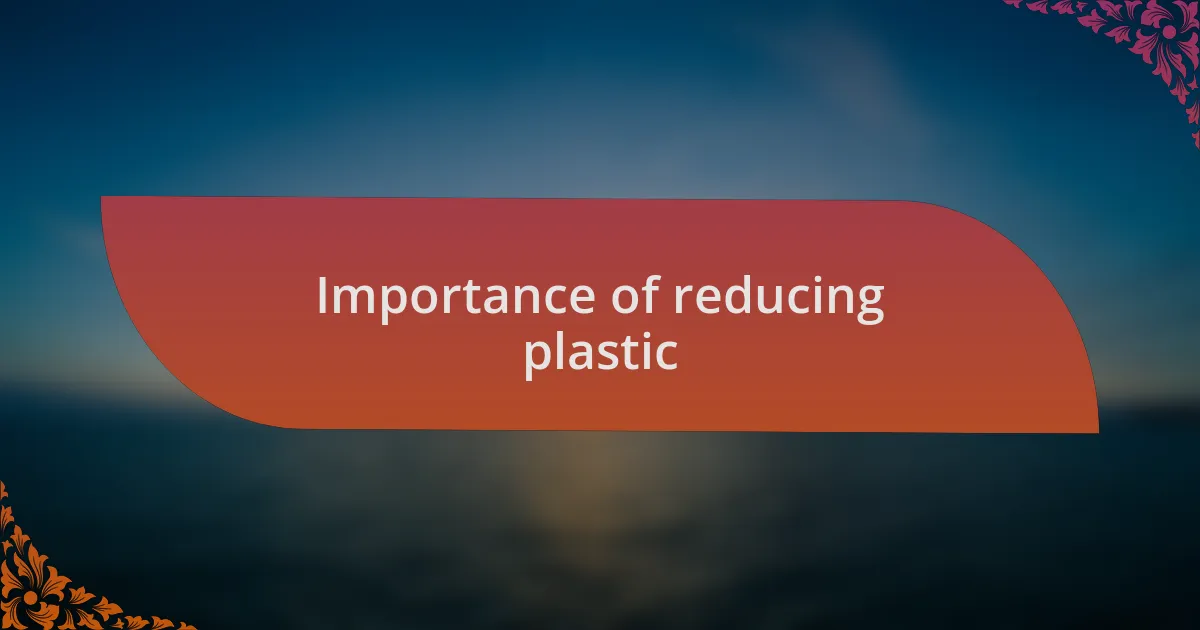
Importance of reducing plastic
Plastic pollution poses a significant threat to marine ecosystems. During my fishing trips, I’ve often seen plastic debris entangled in seaweed or floating on the surface, a stark reminder of how our actions directly impact the ocean. Have you ever witnessed a sea turtle struggling to free itself from a plastic bag? It’s a haunting image that stays with you and highlights the urgency of reducing plastic use.
Beyond the immediate visual impacts, plastic breaks down into microplastics that infiltrate the food chain. I recall a recent fishing endeavor where we caught fish with plastic fragments in their stomachs. It made me reflect on the health implications for both marine life and ourselves. Are we unknowingly consuming toxins that originate from careless plastic disposal? This realization drives home the importance of eliminating plastic from our oceans for the sake of our health and the planet’s future.
Ultimately, reducing plastic isn’t just a personal choice; it’s a global necessity. Every small change we make, whether it’s using reusable tackle bags or supporting local initiatives that combat plastic waste, adds up to a larger movement. I find it incredibly motivating to know that by changing our habits, we can help preserve the ocean’s beauty and biodiversity for generations to come.
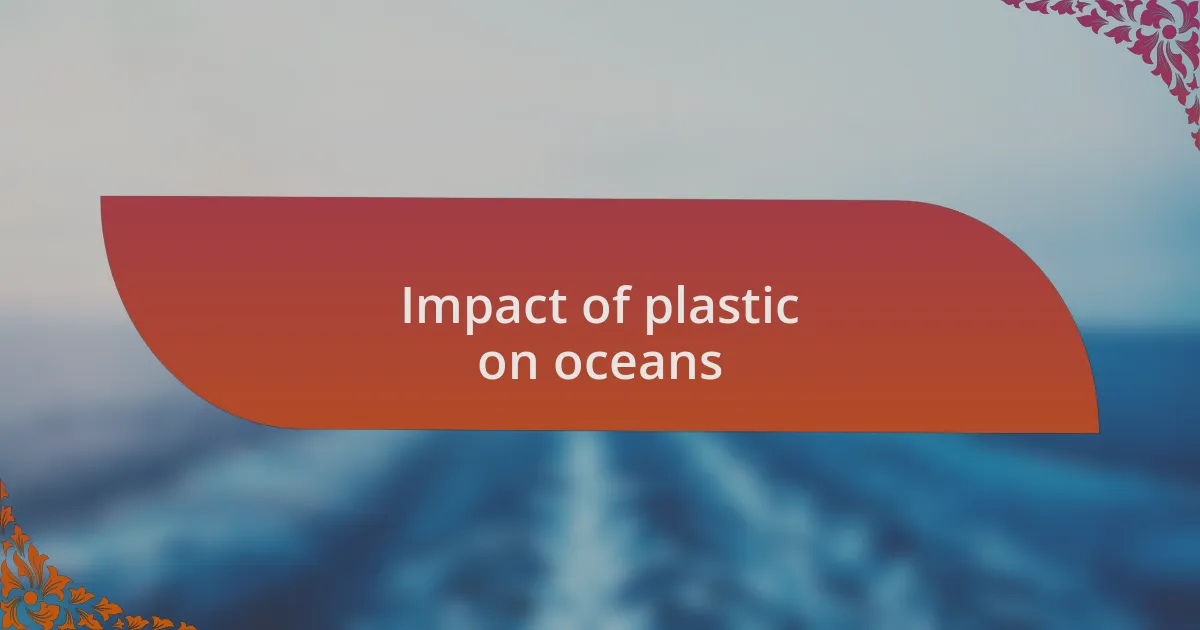
Impact of plastic on oceans
Plastic dramatically alters the delicate balance of our oceans. I recall one fishing trip where, while casting my line, I spotted a seal entangled in discarded fishing nets. It was a heart-wrenching scene that made me realize how our practices can endanger marine life. Have you ever considered how a single piece of plastic can disrupt an entire ecosystem?
The breakdown of plastic into microplastics has long-lasting effects that are often overlooked. On one occasion, while cleaning the catch, I was shocked to find tiny bits of plastic embedded in the flesh of a fish. This was more than just an eye-opener; it was a stark reminder that our choices echo through the food chain. How often do we think about where our food comes from and its broader implications on health?
Moreover, the accumulation of plastic impacts not just wildlife but also our recreational experiences. I frequently enjoy the serenity of fishing at sunrise, surrounded by nature’s beauty. Yet, when I see plastic litter along the shoreline, it diminishes that tranquility. Is it too much to ask for a clean ocean where we can connect with nature without the burden of pollution? Each of us has a role in ensuring that our oceans remain vibrant and healthy.
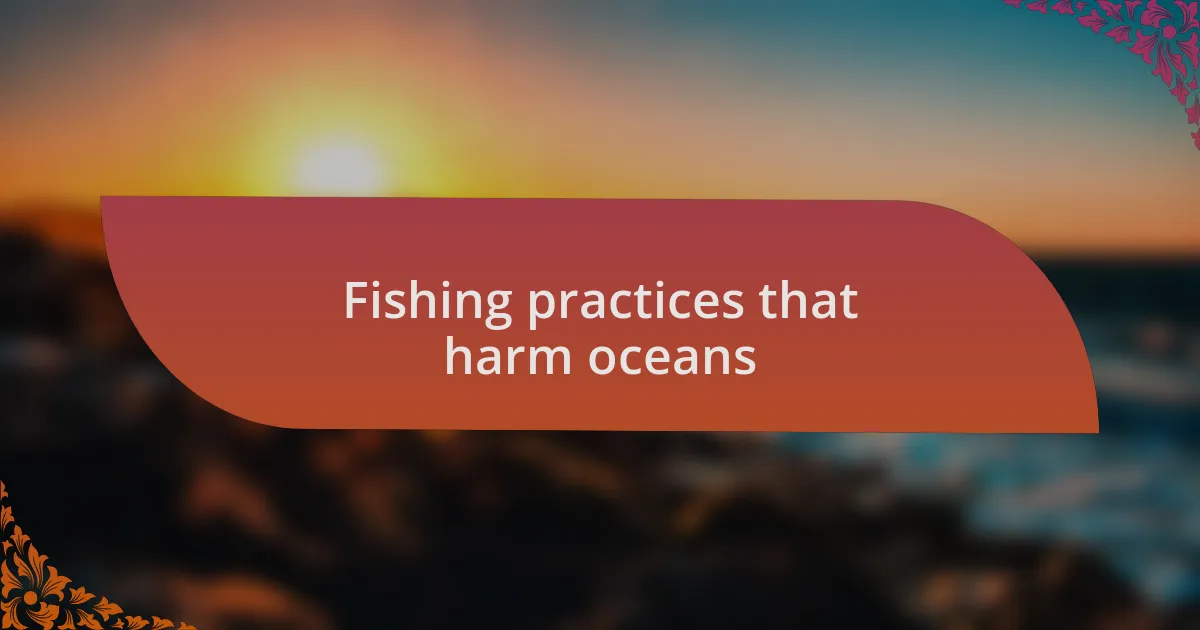
Fishing practices that harm oceans
Overfishing is one of the most destructive practices affecting our oceans. I remember a fishing trip where I went to a spot that used to be teeming with fish, only to find it alarmingly empty. Witnessing such a stark change made me wonder how many others had experienced similar disappointments. What happens when we take too much from these waters without giving them a chance to replenish?
Bycatch, or the unintended capture of non-target species, amplifies the damage done by fishing methods. On one occasion, I watched a small sea turtle struggle in a net, a victim of the very gear meant to snare fish. It hit me hard—how can we continue to justify our practices when innocent creatures pay the price? Isn’t it time we shift our perspective to prioritize the health of the entire ecosystem?
Lastly, the use of harmful bait and tackle can lead to pollution that lingers long after the trip is over. I recall the frustration I felt when I discovered leftover fishing gear littering the shoreline after a day on the water. The irony of trying to enjoy nature while simultaneously contributing to its degradation was not lost on me. Shouldn’t our passion for fishing inspire us to protect the environment instead of harming it?
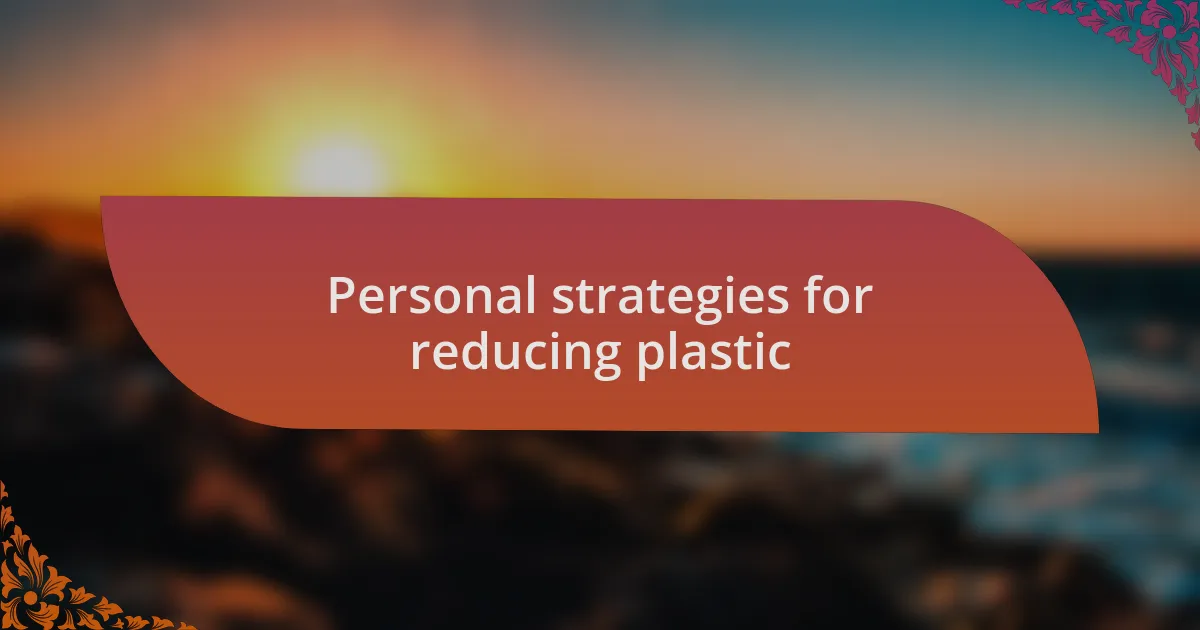
Personal strategies for reducing plastic
When I realized how much plastic waste was accumulating during my fishing trips, I decided to take concrete steps to reduce my impact. I started using biodegradable fishing line, which not only performs well but also breaks down more naturally than its plastic counterparts. It’s a small change, but every bit counts, right?
I also made a commitment to carry a reusable bag with me every time I head out. This bag has become my go-to for collecting any plastic or debris I might stumble upon while fishing. The first time I filled that bag, I felt a mix of pride and sadness. How could I have overlooked the small pieces of plastic that harm marine life?
Additionally, I embraced the practice of DIY tackle-making using more sustainable materials. I remember the satisfaction of crafting my lures from repurposed items I found around the house. Not only did I save money, but I also felt a deeper connection to my craft. Have you ever considered how your choices on the water can ripple out and affect the wider environment? It’s empowering to realize the difference we can make.
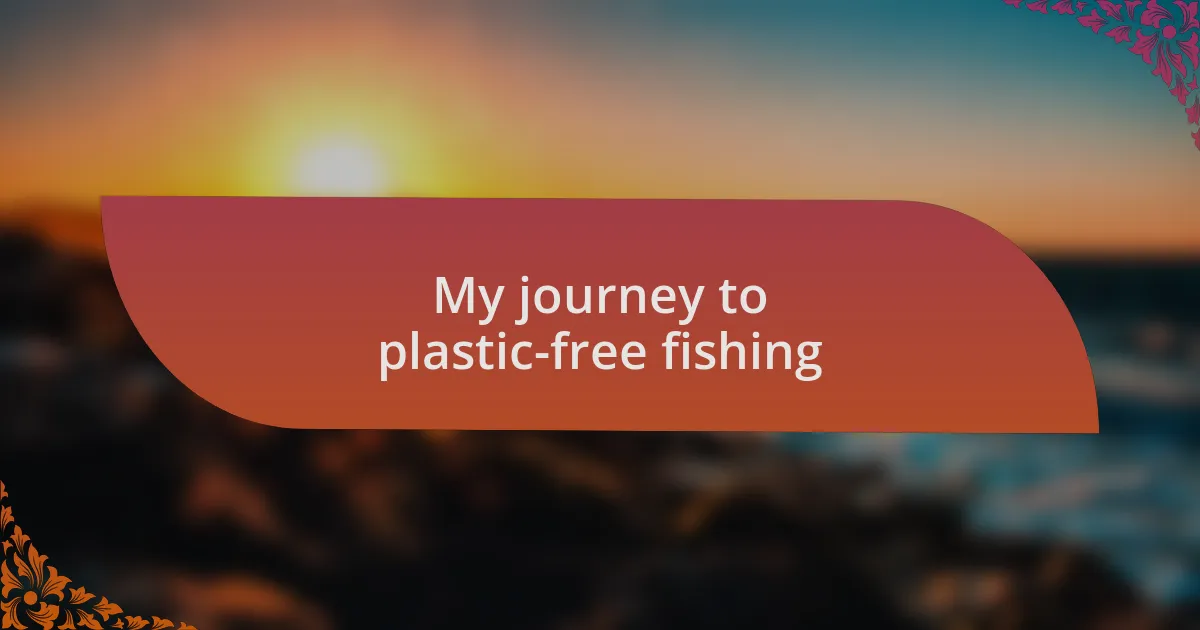
My journey to plastic-free fishing
As I delved deeper into my journey, I also started to question the fishing gear I was using. One day, I came across an old rod and reel in my garage that was covered in dust. Instead of tossing it aside, I decided to refurbish it. Not only did this practice save me money, but it also felt like I was giving a second life to something that would have otherwise ended up in the landfill. Have you ever thought about how much gear is tossed away instead of reused?
Gradually, I began to notice a shift in my mindset. Every trip became an opportunity to be more mindful about the environment. I vividly recall a sunny afternoon out on the water, where I caught a glimpse of a sea turtle swimming majestically nearby. In that moment, I felt a sense of responsibility wash over me. How could I keep contributing to the very pollution that threatened these beautiful creatures? This thought pushed me to research more sustainable practices.
In my quest for plastic-free fishing, I also started connecting with local fishing communities. One particular meeting stands out: we brainstormed ideas for organizing clean-up events at local fishing spots. I left that gathering inspired and armed with new ideas for minimizing plastic use. Isn’t it incredible how collaboration can turn awareness into action? Each conversation sparked new ideas, reinforcing my commitment to a fishing life that prioritizes ocean health.
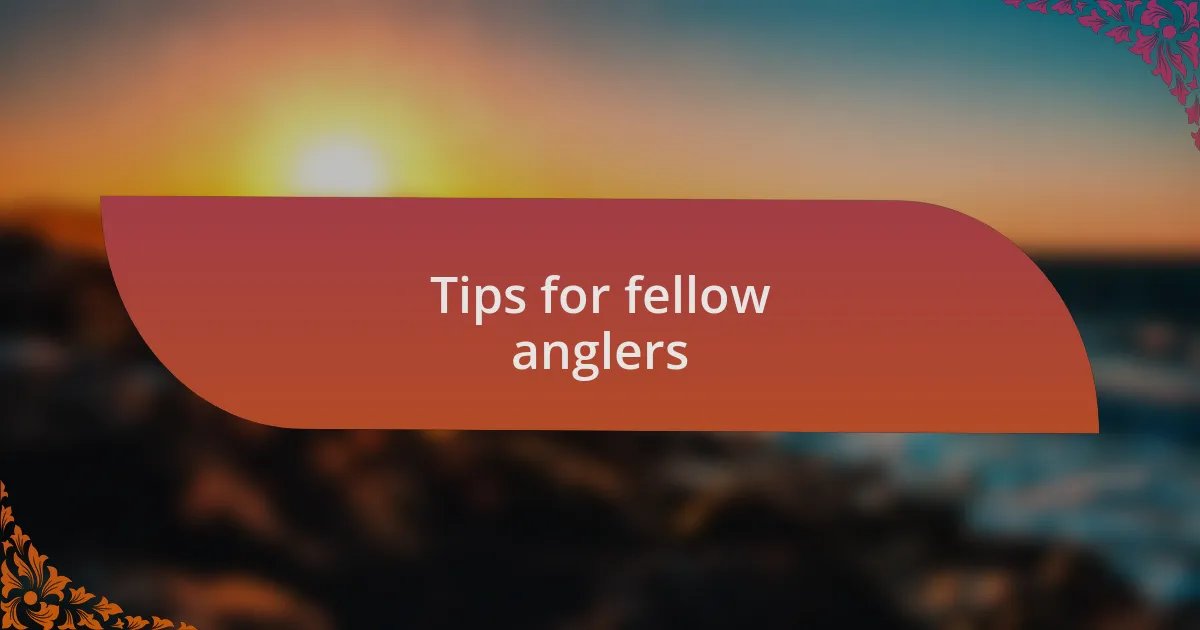
Tips for fellow anglers
When you’re planning your fishing trips, consider swapping out single-use plastic for reusable alternatives. For instance, I now carry a durable, mesh bag for my bait instead of those flimsy plastic containers. It’s a simple change, but it makes a noticeable difference—both in how I feel knowing I’m reducing waste and in keeping our waters cleaner for the wildlife.
I’ve also found that choosing eco-friendly tackle can have a profound impact. My go-to now includes biodegradable fishing line and lead-free weights. Honestly, every time I reel in a catch, knowing that I’ve minimized potential harm to marine life fills me with pride. Isn’t it amazing how thoughtful choices can elevate your experience and connection to nature?
Lastly, becoming an advocate within your local fishing community can amplify your efforts. During a recent group outing, I suggested we incorporate a short clean-up session before we cast our lines. The response was overwhelming; not only did we end up collecting bags full of trash, but we also bonded over our shared commitment to protect our oceans. It’s a beautiful reminder that each small action, taken together, can create waves of change.